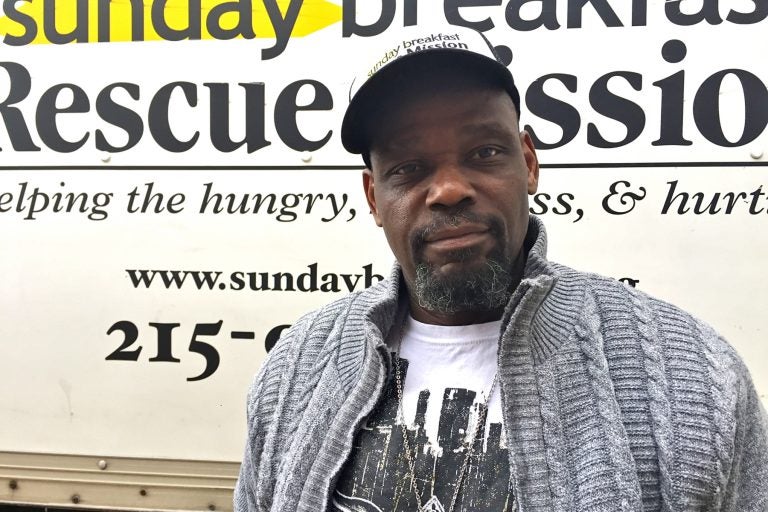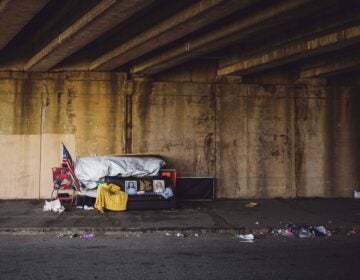Incarceration can launch stubborn cycle of homelessness, Villanova researcher finds
Using homelessness as a barometer, a Villanova criminologist looked at the experiences of more than 10,000 state inmates for nearly a decade after they were released.
Listen 3:17
Former inmate Robert Rice is on this third stay at the Sunday Breakfast Rescue Mission. (Aaron Moselle/WHYY)
New research out of Villanova University is shedding some new light on what’s known about life after prison in the long term.
Using homelessness as a barometer, criminology professor Brianna Remster looked at the experiences of more than 10,000 men, all of them former state prison inmates, for nearly a decade after they were released.
She found 10 percent of them ended up in homeless shelters – often years after they were released and often more than once.
“Living in a homeless shelter repeatedly for months at a time is strong evidence that some people never reintegrate, at least not in almost eight years after release,” said Remster. “Instead, I find evidence of essentially a vicious cycle. Individuals become homeless, get back on their feet, and, within a year, they begin the process over again.”
On average, men stayed at a homeless shelter for about two months at a time; their first stay generally didn’t occur until nearly three years after they were released from prison.
Remster, whose study was published last month in Justice Quarterly, also showed that nearly all of the men who stayed at a shelter – 93 percent – had never been homeless before they were incarcerated.
One man’s experience
That’s what happened to Robert Rice, who was first locked up when he was just 11 years old.
“I spent 27 years in institutions in total — from juvenile to an adult,” said Rice.
Until a about a decade ago, Rice, who was not part of Remster’s study, always had a place to stay when he was released from prison – usually his parents’ house in West Philadelphia, where he grew up.
That changed after Rice spent nearly a decade behind bars for aggravated assault.
“Eight and a half years took a toll on most of the people. And for some of the people that I knew for a long time, it was it was hard to invite a stranger into your house,” he said.
For the first time in his life, he was truly homeless. He went to a shelter and stayed for about a month.
It wouldn’t be the last time.
Rice, 51, is now four months into his third stay at Sunday Breakfast Rescue Mission, the same shelter that took him in all those years ago.
Looking back, he said being defensive and impatient cost him jobs and a life that would have protected him from becoming homeless again. Both of those traits were cemented in prison, he said.
“I need to see a solution now. I can’t wait on nobody. I can’t wait on the law. I can’t wait on God. I need to make a snap decision now, and, a lot of times, it’s detrimental to your well-being,” said Rice.
‘Is this the kind of society we want?’
Professor Reuben Miller, who studies the lives of former inmates at the University of Chicago, said Remster’s study is unique because of the length of time she examined. Most re-entry research covers just the two or three years immediately following release.
“This has real implications for how state and local governments fund housing and supportive housing. It has real implications for how foundations think about directing resources towards programs,” said Miller.
“And, finally, it has real implications for us, the American public, who has an ethical question that we have to address. We have the kind of society that renders people homeless. Is this the kind of society that we want?”
For Remster, his isn’t just a question for Philadelphia, but the country.
Nationally, more than 600,000 people get out of prison each year.
WHYY is your source for fact-based, in-depth journalism and information. As a nonprofit organization, we rely on financial support from readers like you. Please give today.





